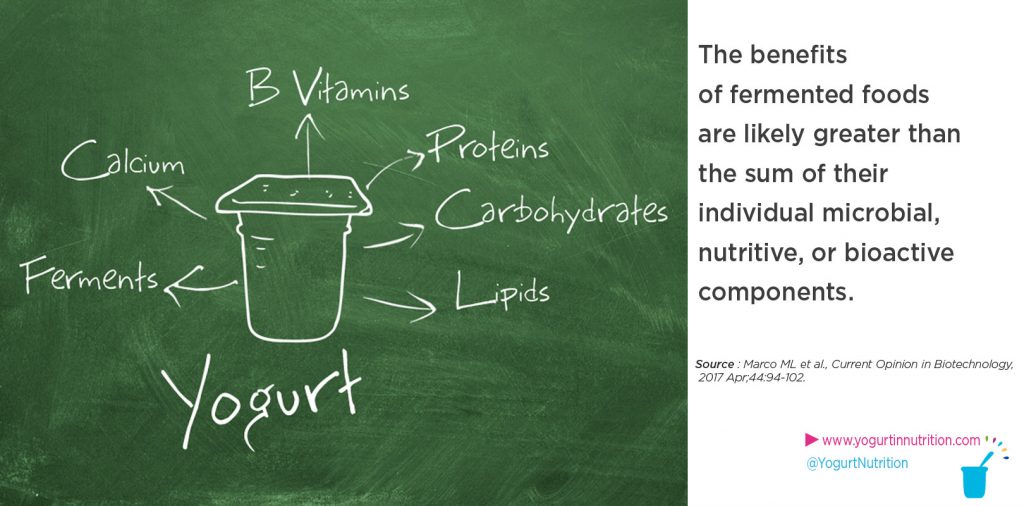If yogurt consumption may have an interest in a balanced healthy diet, recent studies tend to show a surprising effect on behaviors and stress… even depression!
A question of taste
We all know what it’s like to take a bite of something and expecting a specific taste, but tasting something different instead- it can be an enjoyable or disgusting experience. Using different measuring methods for people’s emotional responses(1), a team of researchers searched for the potential emotional effects of eating different yogurts. If there was no difference in the emotional responses to strawberry versus pineapple yogurts, low-fat versions led to more positive emotional responses. Most strikingly, vanilla yogurt elicited a strong positive emotional response.
Can yogurt help reducing depression risk?
The question may seem odd but the answer appears to be promising as two studies(2,3) have shown the probiotic component of yogurt may be associated with reducing depression symptoms. Depression is a common mental disorder, affecting more than 300 million people of all ages.
In this Spanish longitudinal study, 14 539 men and women initially free of depression, were assessed during a median follow-up period of 9.3 years. The authors evaluated their prebiotic intake and yogurt consumption and registered every incident case of depression during the follow-up period. Results suggest that high consumption of whole-fat yogurt was related to a lower risk (-22%) of depression in women. Prebiotic consumption was not significantly associated with depression risk.

How does yogurt affect the mood?
This first step of explanation could lay on the fact that probiotic bacteria in yogurt influence the balance of gut microbiota, which is associated with behavioral changes, through the existence of a gut-brain axis.(4)
Yogurt consumption increases the ingestion of probiotic bacteria, in particular Lactobacilli and Bifidobacteria, and may therefore affect the diversity and balance of human gut microbiota. Previous research found that changes in gut microbiota moderate the peripheral and central nervous system, resulting in altered brain functioning, and may have an impact on emotional behavior, such as stress and anxiety.
The described effect suggests the existence of a gut-brain axis. Because of the bi-directional communication between nervous system and immune system, the effects of yogurt bacteria on the nervous system cannot be separated from effects on the immune system. Researchers suggest(4) that the communication between the gut microbiota and brain can be influenced by the intake of probiotics, which may reduce the level of anxiety and depression, and affect brain activity that controls emotions and sensations. As the composition of gut microbiota is different for each individual, changes in the balance and content of common gut microbes affect the production of short chain fatty acids butyrate, propionate, and acetate. These fermentation products improve host metabolism by stimulating glucose and energy homeostasis, regulating immune responses and epithelial cell growth, and also supporting the functioning of the central and peripheral nervous systems.

How fermented foods make you feel good?
Fermented foods, such as yogurt and fermented milk, wine and beer, sauerkraut and kimchi, are made through controlled microbial growth and enzymatic conversion of major and minor food components. Recent human clinical studies(5) on fermented foods support the possibility that the fermentation, and the contribution of microbes, in particular, may provide additional properties beyond basic nutrition (with weight management or chronic diseases).
There still critical needs for additional fundamental research and randomized, controlled, clinical trials, however, the benefits of fermented food are likely greater than the sum of their individual microbial, nutritive, or bioactive components.
[bctt tweet=”Recent studies on fermented foods support the possibility that the fermentation, and the contribution of microbes may provide additional properties beyond basic nutrition.” username=”YogurtNutrition”]4 reasons to eat more fermented foods like yogurt:
- Many of the species found in fermented foods are related to probiotic strains.
- Fermented foods can be an important dietary source of live microorganisms.
- Fermentation can enhance or alter nutritive and health-modulating properties of food constituents.
- Microbes in fermented foods helps to digest, produce vitamins like B12 and K, introduce new compounds to the foods that are delivered to the gut

Source:
Mojet J et al, Are implicit emotion measurements evoked by food unrelated to liking?, Food Research International, 2015, Vol 76
Cornago AP et al. The Journal of Nutrition 2016
Marin, I. A. et al. Sciences Report 2017; 7, 43859; doi: 10.1038/srep43859
Bienenstock, J. et al., Microbiota and the gut–brain axis , August 2015, Vol 73(8), pp. 28-31.
Marco M L et al. Current Opinion in Biotechnology 2017;44:94-102





